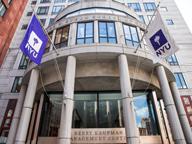Excerpt from
Poets & Quants -- “‘Location and the Fertitta Veterans Program made Stern my target,’ Johnny shared with me, ‘but Stern’s top-tier reputation, international opportunities, focus on EQ+IQ and positive interactions with Sternies throughout the admissions process only reinforced my desire to be part of this community.’”
“For Dan, the Military Veterans Club (MVC) has provided community within Stern from the very beginning. ‘The day before my Stern interview, an MBA student from the club reached out to offer support,’ he told me. Now, it is his turn. As co-presidents, Dan and Johnny have focused on strengthening networking opportunities through club activities. At the same time, they have connected MVC to the executive MBA and part-time programs at Stern to widen the actual network and increased the pipeline by partnering directly with admissions to find the best candidates.”














